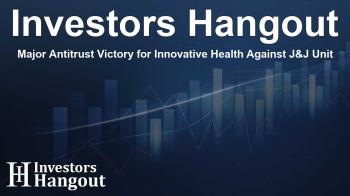Major Antitrust Victory for Innovative Health Against J&J Unit

Berger Montague Secures Landmark Antitrust Verdict
In a noteworthy victory for innovative healthcare solutions, Berger Montague, a leading plaintiffs' law firm, has won a staggering $147 million jury verdict against Johnson & Johnson's medical technology unit, Biosense Webster. This significant ruling came after nearly six years of intense legal proceedings, highlighting the ongoing challenges in the healthcare sector related to anti-competitive practices.
The Case and Its Implications
The jury's decision marked a pivotal moment for Innovative Health, which was awarded damages following extensive litigation. This outcome not only underscores the firm's dedication to client advocacy but also addresses the pressing concerns associated with soaring healthcare costs, a crucial issue for many hospitals and patients alike.
Legal Team and Their Approach
Joshua P. Davis, Shareholder at Berger Montague, expressed his satisfaction with the verdict, emphasizing the significance of this outcome for Innovative Health. He described the case as particularly complex, noting that a district judge had previously granted summary judgment in favor of Biosense. However, Berger Montague's skilled legal team successfully appealed this decision, illuminating the firm's unwavering commitment to pursuing justice.
Key Aspects of the Case
This landmark judgment emphasizes the importance of fair competition in the medical technology industry. It revolves around allegations that Biosense Webster engaged in anti-competitive behavior by limiting clinical support to hospitals that did not exclusively use its new catheters. While these tactics aimed to boost profits, they potentially jeopardized patient care and increased treatment costs.
Overturning Challenges
Three years prior, Judge James V. Selna had ruled in favor of Biosense by granting summary judgment. However, upon collaboration with their co-counsel, Berger Montague's team succeeded in persuading the Ninth Circuit to overturn this decision. In a narrow 2-1 vote, the appellate court acknowledged a viable factual dispute concerning Biosense’s practices of tying support services to the purchase of its equipment, promoting competition in the sector.
Trial Proceedings and Verdict
The trial, which spanned eight days, culminated in a unanimous verdict from the jury after just two hours of deliberation. Lawyers representing Innovative Health argued that a policy enforced by Biosense in 2016 cut off essential support to hospitals which had chosen to use Innovative's catheter technology. This policy not only affected practices but also potentially endangered patients requiring treatments for critical heart conditions.
Firm's Reputation and Future Focus
Eric L. Cramer, the firm’s Chair, further emphasized Berger Montague's resilience in advocating for justice throughout complex antitrust disputes. The firm's notable experience encompasses a diverse range of practice areas, solidifying its position as a prominent player in the antitrust space.
Conclusion and Looking Ahead
As the legal landscape continues to evolve, this monumental verdict serves as a reminder of the importance of maintaining competitive practices that support innovation and accessibility in healthcare. Berger Montague's successful handling of this case exemplifies their commitment to eradicating unfair practices and advocating for patient needs in a rapidly changing industry.
Frequently Asked Questions
What was the outcome of the case involving Berger Montague?
Berger Montague won a $147 million jury verdict for Innovative Health against Biosense Webster, addressing anti-competitive practices.
Who led the legal team at Berger Montague?
Joshua P. Davis led the legal team at Berger Montague that tackled this complex antitrust case.
What were the main allegations against Biosense Webster?
Biosense Webster was accused of restricting support to hospitals that did not use its new catheters, limiting competition and impacting healthcare costs.
What implications does this verdict have for the healthcare industry?
This verdict highlights the necessity of fair competition in the medical technology sector, potentially leading to reduced healthcare costs and improved patient care.
How long did the trial last?
The trial lasted eight days, with the jury reaching a unanimous verdict shortly after deliberation began.
About The Author
Contact Evelyn Baker privately here. Or send an email with ATTN: Evelyn Baker as the subject to contact@investorshangout.com.
About Investors Hangout
Investors Hangout is a leading online stock forum for financial discussion and learning, offering a wide range of free tools and resources. It draws in traders of all levels, who exchange market knowledge, investigate trading tactics, and keep an eye on industry developments in real time. Featuring financial articles, stock message boards, quotes, charts, company profiles, and live news updates. Through cooperative learning and a wealth of informational resources, it helps users from novices creating their first portfolios to experts honing their techniques. Join Investors Hangout today: https://investorshangout.com/
The content of this article is based on factual, publicly available information and does not represent legal, financial, or investment advice. Investors Hangout does not offer financial advice, and the author is not a licensed financial advisor. Consult a qualified advisor before making any financial or investment decisions based on this article. This article should not be considered advice to purchase, sell, or hold any securities or other investments. If any of the material provided here is inaccurate, please contact us for corrections.

